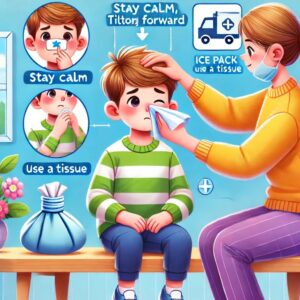Recently, I was chatting with the mother of a middle school student, and she mentioned at the end of our conversation, “He’s already 12 years old and still bites his nails.” This made me reflect on the fact that some children’s nail-biting habits do not change as they grow older. I asked her if the family was perhaps too strict with the child. She replied that the father was very strict, and the child hardly had any personal time. Especially with academic pressure, the child’s temper had worsened, and he became easily angry.
Four Long-Term Dangers of Nail Biting
- Nail Bed Injury: Biting nails can lead to injuries on the nail bed, causing the nails to embed into the skin, which looks quite alarming.
- Decreased Immunity: Contact with the nails can lead to stomach issues, colds, and other problems.
- Facial and Dental Issues: The habit of nail-biting can cause tension in the jaw muscles, affecting facial shape and dental aesthetics.
- Mental Health Impact: Children may become obsessed with nail-biting but feel regret afterward. Over time, this internal conflict can lead to a sensitive personality.
Why Do Children Bite Their Nails?
Every child’s situation is different, but environmental pressure is a primary reason for nail-biting. I remember a child who bit his nails; before he turned four, his nails grew very quickly, requiring frequent trimming. When he first started kindergarten, he was very happy, but he often fell ill and had a persistent cough.
Later, he switched to a strict kindergarten. Although he got sick less often, he developed the habit of nail-biting. No matter what the parents said, it didn’t help. After consulting with a psychology friend, they discovered the child’s needs might not have been met. Therefore, the parent decided against medication since the child was healthy otherwise.
The mother decided to let him take a month off and then transferred him to a more relaxed kindergarten. After just a week at the new school, the child said, “Mom, thank you! I really like my new kindergarten.” Although the nail-biting habit hadn’t completely disappeared, his nails gradually began to grow back, and the situation improved.
Five Tips to Help Stop Nail Biting
- Accept Individual Growth Differences: Give children the space and time they need to adapt.
- Encourage Interests: Allow children to participate in extracurricular activities they enjoy, ensuring they have time to play.
- Communicate on the Way Home: Share thoughts and feelings with each other to strengthen your bond.
- Affirm Your Love: Regularly tell your child, “I love you, no conditions attached.”
- Shift Your Focus: Rather than constantly monitoring their nail-biting, focus on whether they are happy.
As parents, we must love our children unconditionally and accept their emotions. Emotions need to be acknowledged and accepted to prevent resistance. If you have a child who bites their nails, start by observing their physical health. Once you’ve ruled out any medical issues, consider environmental factors. We all want our children to take care of their bodies and not harm themselves without reason. Sensitive children, in particular, are more attuned to their surroundings. By genuinely supporting them and understanding their emotions, we can help them relax and let go.













